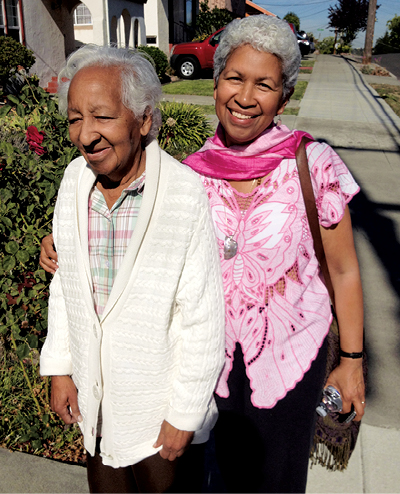Embracing culture,
building caregiver support
Edda Caraballo’s mom lost her battle with Alzheimer’s disease nearly four years ago, but Caraballo still works to reclaim her life. Juggling a full-time job in Sacramento with round-the-clock caregiving on weekends in Oakland took a tremendous toll on her.
“After pushing myself beyond the limit for a year and a half, I had a mini nervous breakdown on the train one Sunday coming home. I freaked out,” Caraballo recalls. “I was always stressed out and running on fumes. What snapped me out of it was the thought that my mother would have to bury me!”
A social worker counseled Caraballo to have a life, rather than let caregiving consume her life. Nearly 2 million Latinos nationwide face a similar plight as they care for family members with Alzheimer’s disease and other types of dementia. Yet, studies show they are less likely than whites to use formal care services, such as nursing home care.
“We take care of our parents no matter what. It’s our duty,” Caraballo says. “My brother, my sister and I never considered putting her in a home.”
Ester Carolina Apesoa-Varano, an associate professor at the Betty Irene Moore School of Nursing at UC Davis, has spent the past five years assessing how social capital and ethnicity impact Latina caregivers’ experiences over time as they care for someone with Alzheimer’s disease. Factors such as social resources, group membership, trust, relationships within the community and socioeconomics are often neglected as important in promoting caregiver well-being.
“Caregiving for older relatives with dementia is a stressful and challenging obligation, which disproportionately passes to women in families,” says Apesoa-Varano, a sociologist whose research is dedicated to geriatric studies to advance health for older people. “For many Latinas, familismo — the expectation that family members will support and assist one another, including aging relatives — defines adult life.”
The number of U.S. Latinos with Alzheimer’s disease is expected to rise by more than eight times by 2060, according to a report by the USC Edward R. Roybal Institute on Aging. Many Latinas connect with others outside their families through neighborhood groups, church congregations and social clubs. Yet Apesoa-Varano’s research points to a gap in community-based support, which critically informs the next phase of her research.
“My goal is to identify and establish partnerships with community groups, then develop protocols that support these caregivers through their journey,” Apesoa-Varano says. “We must tap into those networks where trust, motivation and social supports already exist.”
Apesoa-Varano envisions a model in which laypeople are trained in how to provide basic emotional support to caregivers in an effort to reduce or prevent social isolation and loneliness, thereby improving caregivers’ emotional well-being.
While Caraballo had support from her siblings during her mother’s three-year Alzheimer’s disease fight, that family dynamic added to the stress. She developed high blood pressure, her sister suffered from a tumor and her brother’s marriage fell apart. She says external support systems are critical to surviving the role of caregiver.
“Latina women definitely need to support each other in terms of getting our lives back and not being martyrs,” Caraballo says. “But if I had to do it over again, I would. Being at home with my mother for her last breath meant the world to me. That moment taught me that life is a precious gift.”


